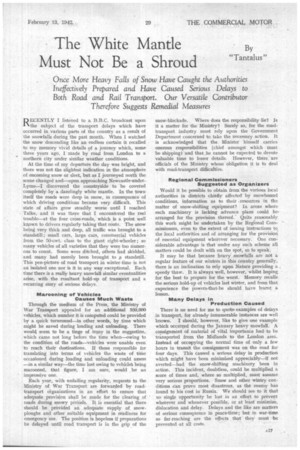The White Mantle By Must Not Be a Shroud • "Tantalus"
Page 29

If you've noticed an error in this article please click here to report it so we can fix it.
Once More Heavy Falls of Snow Have Caught the Authorities Ineffectively Prepared and Have Caused Serious Delays to Both Road and Rail Transport. Our Versatile Contributor Therefore Suggests Remedial Measures
DECENTLY I listened to a B.B.C. broadcast upon "the subject of the transport delays which have occurred In. various parts of the country as a result of the snowfalls during the past month. When I watched the snow descending like an endless curtain it recalled to my memory vivid details of a journey which, some three years ago, I made by road from London to a northern city under similar weather conditions.
At the time of my departure the day was bright, and there was not the slightest indication in the atmosphere of oncoming snow or sleet, but as I journeyed north the scene Changed and—upon approaching Newcastle-underLyme—I discovered the countryside to be covered completely by 'a dazzlingly white mantle. In the town itself the roads were deep in snow, in consequence of which driving conditions became very difficult. This state of affairs grow steadily worse until I reached Talke, and it was there that I encountered the real trouble—at the four cross-roads, which is a point well known to drivers regularly taking that route. The snow being very thick and deep, all traffic was brought to a standstill.; small cars, large cars, comthercial vehicles from the 50-cwt. class to the giant eight-wheeler ; so • many vehicles of all varieties that they were too numerous to count. Some were ditched, others had skidded, and many had merely been brought to ,n standstill. This pen-picture of road transport in winter-time is not an isolated one nor is it in any way exceptional. Each time there is a really heavy snowfall similar eventualities arise, with the resultant hold-up of transport and a recurring story of serious delays.
Marooning of Vehicles Causes Much Waste
Through the medium of the Press, the Ministry of War Transport appealed for an additional 100,000 vehicles, which number it is computed could be provided by a quick turnround—in other words, by time which might be saved during loading and. unloading. There would seem to be a tinge of irony in the suggestion, which came not long before the time when—owing to the condition of the roads—vehicles were unable even to reach their destinations. If those responsible for translating into terms of vehicles the waste of time occasioned during loading And unloading could assess —in a similar way—the time lost owing to vehicle 'S being marooned, that figure, I am sure, would be an impressive one.
Each year, with unfailing regularity, requests to the Ministry of War Transport are forwarded by roadtransport drganizations in an effort to ensure that adequate provision shall, be made for the Clearing of roads during snowy periods. It is essential that there should be provided an adequate supply of snowploughs and other suitable equipment in readiness for emergency use. The position is hopeless if preparations be delayed until road transport is in the grip of the
snow-blockade. Where does the responsibility lie? Is it a matter for the Ministry? Surely so, for the roadtransport industry must rely upon the Government Department concerned to take the necessary action. It is acknowledged that the Minister himself carries onerous responsibilities (chief amongst which must be shipping) and that he cannot be expected to devote valuable time to lesser details. However, there are officials of the Ministry whose obligation it is to deal with road-transport difficulties.
Regional Commissioners
Suggested as Organizers
Would it be possible to obtain from the various local authorities in districts chiefly affected by snowbound conditions, information as to their -resources in the matter of snow-shifting equipment? In areas where such machinery is lacking advance plans could be arranged for the provision thereof.' Quite reasonably this work might be undertaken by the Regional Commissioners, even to the extent of issuing instructions to the local authorities and of arranging for the provision of essential equipment where-ver necessary. One considerable advantage is that under, any such scheme all matters could be dealt with on the spot, so to speak.
It may be that because heavy' .snowfalls are not a regular feature of our winters in this country generally, there is an inclination to rely upon Nature providing a speedy thaw. It is always well, however, whilst hoping for the best to prepare for the worst. Memory recalls the serious hold-up of vehicles last winter, and from that experience the powers-that-be should have learnt a lesson.
Many Delays in Production Caused
There is no need for me to quote examples of delays in transport, for already innumerable instances are well known. I should; however, like to give one example which occurred during the January heavy snowfall. A consignment of material of vital importance had to be transported from the Midlands to the London area. Instead of occupying the normal time of only a few hours in transit the consignment was on the road for four days. This caused a serious delay in production which might have been minimized appreciably--r-if not
averted had the 'snow-shifting machinery been in action. This incident, doubtless, could be multiplied a score of times and, where so multiplied, must assume very serious proportions. Snow and other wintry conditions can prove most disastrous, as the enemy has found to his cost in Russia. We should inc to it that singl,,e opportunity be lost in an effort to prevent wherever and whenever possible, or at least minimize, dislocation and delay. Delays and the like are matters of serious consequence in peace-time; but in war-time so far-reaching are the effects that they must be prevented -at all costs.




















































